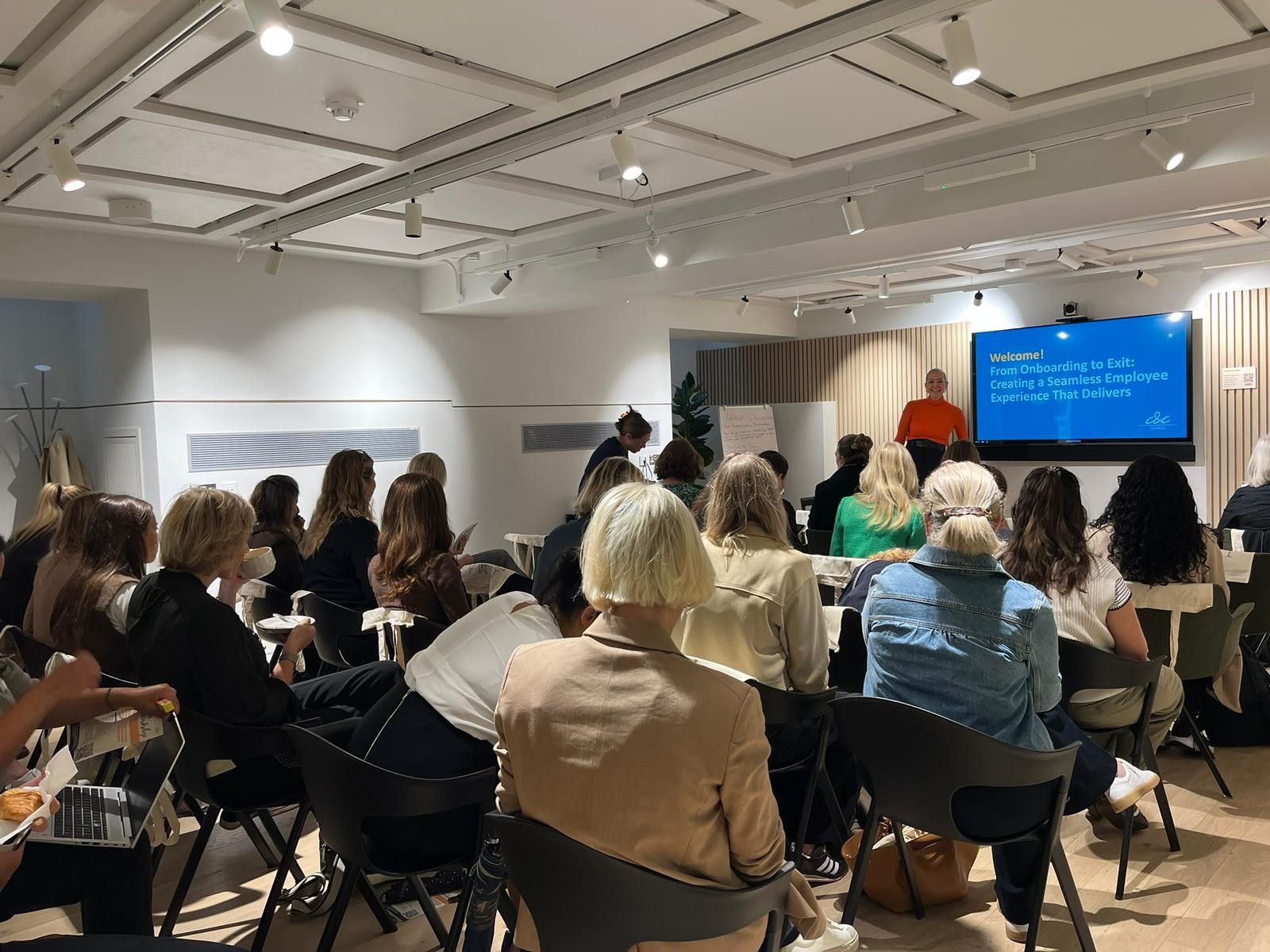Welcome & Context
The HR Roundtable explored how organisations can transform onboarding from a tick-box exercise into a powerful retention and engagement strategy.
Key insights included:
1 in 3 new hires quit within 12 months.
Replacing an employee costs 50–200% of salary (Gallup).
Most onboarding ends within a week, but best practice is a 6–12 month journey.
Key question:Is your onboarding a tick-box process, or a retention strategy?
Key Data & Insights
Candidate & new starter ghosting and early drop-outs remain a challenge.
Perception of onboarding quality directly affects retention.
Structured onboarding improves productivity and retention.
Lack of clarity, structure, and preparedness is common.
HR teams face challenges balancing compliance, engagement, tech, and manager accountability.
The 5 Things Great Companies Do
Create clarity with structured timelines & touchpoints.
Prioritise cultural immersion (storytelling, buddy systems, ERGs).
Build networks early (leadership lunches, mentoring).
Support career development from Day 1 (clear 30/60/90s, L&D access).
Enable productivity with tools ready and personalised welcomes.
Reflection Prompt:If you could implement one tomorrow, which would move the needle most?
What 'WOW' Onboarding Looks Like
Cultural Mastery: Storytelling, culture ambassadors, volunteering opportunities.
Network Building: Leadership lunches, cross-functional buddies, networking maps.
Career Support: 30/60/90 goals, L&D access, shadowing opportunities.
Strategy Immersion: Simulations, gamified onboarding, linking strategy → team goals.
Tools to Do the Job: IT, logins, passes ready; survival guides and welcome packs.
Pre-boarding Best Practice: Onboarding packs sent out 2+ weeks before start, buddy introductions before Day 1.
Cross-Departmental Buddies: Pair new hires with someone outside their team to accelerate culture learning.
Impact Projects: Assign a scoped, meaningful project in the first 3 months to drive learning and contribution.
Group Discussions & Insights
From Transactional to Transformational: Shifting from compliance to engagement.
The First 90 Days: What must a new hire see, feel, and experience to say, "I made the right choice"?
Measuring Success: Which single metric would prove onboarding is working? (e.g. 12-month retention, NPS, time-to-productivity).
Quick Wins & Longer-Term Fixes
Quick Wins (within 3 months):
Buddy schemes (including cross-departmental).
Personalised notes.
Onboarding packs & buddy intros 2 weeks pre-start.
IT readiness.
Longer-Term Fixes (6–12 months):
Onboarding portals.
Re-boarding for internal moves, parental leave, or long-term absences.
Manager 30/60/90 check-ins.
Impact project frameworks.
One Metric That Matters: Choose and track consistently.
Management Onboarding Training
A consistent theme was the urgent need for managers to be trained in how to onboard effectively.
Managers require:
A clear structure.
A checklist of responsibilities.
The right questions to ask.
This ensures onboarding is not left solely to HR, but becomes a team and leadership priority.
Manager Onboarding Conversation Guide
40 questions across four key milestones (Weeks 1, 4, 8, 12).
Week 1 – Welcome & Clarity
How has your first week compared with what you expected?
What feels most clear about your role right now?
Is there anything that feels confusing or unclear?
Who have you met that has been most helpful so far?
Who else would you like me to introduce you to?
Do you feel you have the tools, systems, and information you need?
Is the buddy system helpful to you — and how often are you connecting?
What’s been the most energising part of your first few days?
What’s been the most challenging moment so far?
Is there anything I can do differently to support you right now?
Week 4 – Confidence & Belonging
How confident are you feeling in your responsibilities at this stage?
Which tasks or projects are you enjoying most?
Which areas still feel more challenging?
How well do you feel connected with the wider team?
Has the buddy relationship been valuable so far?
How do you feel about the pace and workload?
What’s one thing that has surprised you about the culture?
What’s one thing that would make the next month smoother?
Do you feel you’re starting to make a contribution?
Is there any extra training or support that would be helpful right now?
Week 8 – Contribution & Impact
What contributions are you most proud of so far?
Where do you feel you’ve added the most value?
Which relationships are proving most important to your success?
Are there any areas where you still feel like an outsider?
How are you finding your impact project (if assigned)?
What feedback have you received so far, and how has it landed?
What’s been the most rewarding part of the role to date?
What’s the biggest challenge you’ve faced, and how have you handled it?
What new skills or knowledge have you picked up since joining?
If you could change one thing about your onboarding so far, what would it be?
Week 12 – Growth & Future
How well do you feel you understand our strategy and your role within it?
Do you feel confident that you’re set up for success here?
What skills or experiences do you want to develop over the next 6–12 months?
What part of the role excites you most about the future?
Where would you like more autonomy or responsibility?
Who else in the business would you like greater exposure to?
Do you feel you’ve made the right choice in joining us?
What feedback do you have for me as your manager?
What feedback do you have about our onboarding process overall?
What would make you feel even more engaged and supported going forward?









